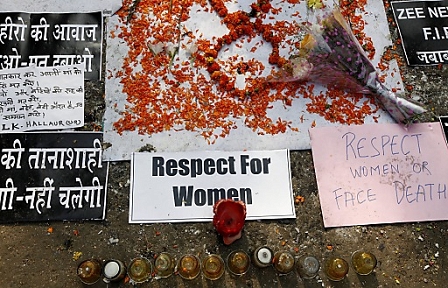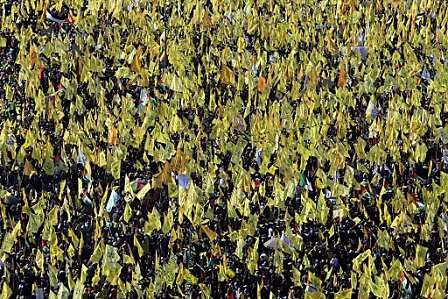Erstellt am: 7. 1. 2013 - 15:20 Uhr
India looks to itself
Subscribe to the Reality Check podcast and get the whole programme after the show.
The horrific gang rape of a young woman on a bus in Delhi was top of the headlines before the Christmas break, and it's still there. The woman died of her injuries two weeks later in a Singapore hospital - but the outcry the attack has generated is promising to fundamentally shake up Indian attitudes not only towards women, but towards how such crimes are handled.

EPA/HT LB
As more and more details of the case come out, the wider the blame spreads and the greater the shock and anger generated in all levels of Indian society.
Quite apart from the gruesome details of the attack itself, it is now emerging that the women, together with her male companion, were thrown off the bus, naked, beaten and bleeding, onto the cold night-time roadside. However, the road was not deserted: people were passing them, and even stopping, unbelievably, not to help, but to watch their suffering. Our Delhi correspondent, Geeta Pandy, says this is not unusual in the Indian capital. People are reluctant to get involved in scenes of crime, but are nevertheless fascinated by them.
When the police arrived, instead of immediately summoning medical help for the two victims, they started squabbling about who had jurisdiction - and argument that cost considerable time, and that people are now saying may have cost the woman her life. Had she been taken to hospital immediately, maybe there would have been a chance for her to survive.
Alongside the failings of the police and the attitude of people to crime, is also the social attitude towards women. It's a curious paradox, that while India has some of the world's most successful and powerful women, it also has some of the backward and repressive traditions in the treatment of women.
There is certainly momentum for change running behind this case, but whether it will lead to change, remains to be seen. A piece of good news over the holiday was that Malala Yousufzai, the 15 year old girl shot by the Taliban in Pakistan for promoting education for girls, was able to leave the British hospital where she was being treated. Although she will need further medical attention, she is well enough to live with her parents and two brothers at their new home in Birmingham. On a sobering note, there was hope that her case would change attitudes in Pakistan, but after a few weeks of outrage, everything went back to normal.
Dieses Element ist nicht mehr verfügbar
Assad's "puppet" speech
Syria's President Assad seems still to be convinced that he will win the country's bloody and prolonged civil war. In a speech yesterday, he accused the west of orchestrating the uprising, and appealed to Syrians to resist what he describes as a conspiracy. Analysts are saying this is confirmation, if it were needed, that any diplomatic initiatives are doomed to fail.
Syria analyst, Rime Allaf, explains why Assad still has credibility with his own people.
Dieses Element ist nicht mehr verfügbar
Switzerland's guns
Following the fatal shooting in the village of Daillon last week Imogen Foulkes explains the Swiss attitude to guns and why they have no restrictions on gun ownership.
Dieses Element ist nicht mehr verfügbar
Palestine begins to unite

EPA/MS MDA
Irris Makler reports on the historic Fatah rallies in Gaza which illustrate a moving together of Hamas and Fatah, as Palestine starts to officially establish itself.
Dieses Element ist nicht mehr verfügbar
Northern Ireland flag row
In Belfast, violence continues over the council's decision not to fly the British flag 365 days a year. Peter Shirlow of Queens University in Belfast explains the different views on the dispute and within the rapidly changing Belfast society.
Dieses Element ist nicht mehr verfügbar
FM4 Reality Check
Monday to Friday from 12.00 to 14.00, and after the show via Podcast or fm4.orf.at/realitycheck.


